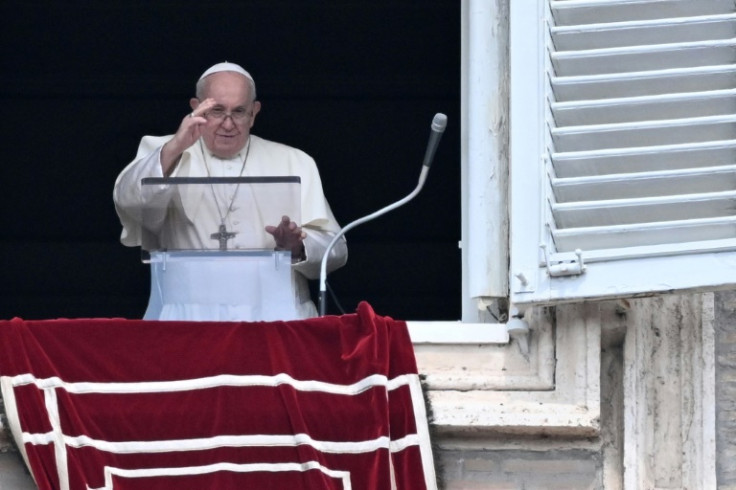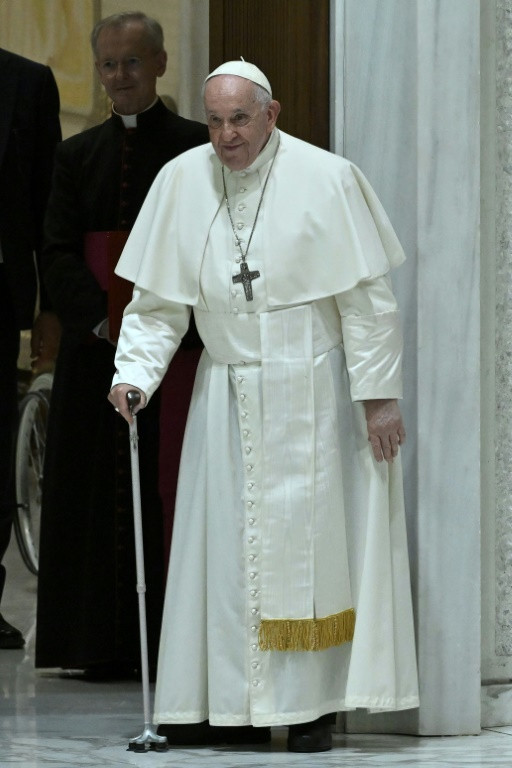Few Catholics In Mongolia, But Pope's Visit Eyes Geopolitics

Pope Francis heads to Mongolia this week, an unlikely choice given the isolated nation's small Catholic community, but a strategic one due to the young democracy's geographical position between two superpowers.
In venturing to the sparsely populated, vast Buddhist-majority nation, the pope may eye Mongolia as a way to help build bridges with its neighbours China and Russia, given its strategic location and neutrality in the volatile region.
The trip, which involves a nine-hour flight from Rome on Thursday to the capital of Ulaanbaatar, will also be closely watched as a stamina test for the 86-year-old pope, who underwent hernia surgery in June and suffers pain when walking.
A former Soviet satellite state that has been a democracy since 1992, Mongolia has one of the world's youngest and smallest Catholic communities, estimated at approximately 1,400 people among its population of 3.3 million.
It has just 25 Catholic priests -- only two of them Mongolian -- and 33 nuns, according to the Vatican, although its ranks include the global Church's youngest cardinal.
Pope Francis's trip to rapidly urbanising Ulaanbaatar represents the Jesuit's desire to bring the Church's message to remote, largely ignored areas far from Rome while championing interfaith dialogue.
It will be "the opportunity to embrace a Church small in numbers but vibrant in faith and great in charity," the pope said Sunday.
But the trip, lasting until September 4, also has undeniably geopolitical aims.
The Vatican's long-term thinking is "to retain a presence and openness in countries where that's not an inevitability", Paul Elie, a senior fellow at Georgetown University's Berkley Center for Religion, Peace and World Affairs in Washington, told AFP.
"If going to Mongolia keeps the door open to that whole region, it's an effective visit with relatively few downsides," he said.
Once part of the empire of Genghis Khan, landlocked Mongolia is sandwiched between Russia and China, dependent on the former for energy imports and on the latter for the export of its raw materials, primarily coal.
But Mongolia has sought to toe a neutral line with its expansionist neighbours, while reaching for balance among powers including the United States, Japan and South Korea.
That makes Mongolia potentially helpful for Vatican relations with both Beijing, with whom the Holy See last year renewed a deal on the thorny issue of bishop appointments, and Moscow, with which Pope Francis has sought to broker an end to the war in Ukraine.
Mongolia also maintains relations with North Korea.
"It has no disputes with its neighbours -- in Asia that's pretty rare," said Mongolia expert Julian Dierkes, a professor at the University of British Columbia.
"And it's really the only post-Socialist democracy in Asia, all the others have fallen by the wayside."
That has spurred a "rediscovery of values" between democratic nations and Mongolia, he said, amid rising Russian aggression and concern over an unchecked China.
The first pope to visit Mongolia, the pontiff arrives Friday morning but will have a day of rest before formal meetings Saturday, including with Prime Minister Luvsannamsrai Oyun-Erdene, members of civil society, diplomats, priests and missionaries.
On Sunday, he will address an interreligious meeting -- one of five public addresses scheduled -- and preside over a mass inside a newly built ice hockey arena.
He is not scheduled to venture outside Ulaanbaatar, where a decade-long mining windfall has fuelled a construction boom.
Pope Francis may use his trip to address his concerns about the impacts of climate change, which along with mining and overgrazing is fuelling desertification across swathes of Mongolia's territory.
Extreme weather, from severe floods to drought and sandstorms, has killed off herds on the vast grasslands, forcing nomads who make up one-third of the population to migrate to Ulaanbaatar.
Shantytowns inhabited by displaced nomads now surround the capital.
In December, protests broke out over a coal industry corruption scandal, exacerbated by ongoing popular discontent over a weak economy and high inflation tied to Covid and the Ukraine war.
The pope's visit follows a flurry of diplomatic activity for Mongolia in recent months, including Luvsannamsrai's visit to Washington this month and a visit by French President Emmanuel Macron in June.
A Mongolian delegation of Buddhist monks and Catholic priests visited the Vatican last year to mark the 30th anniversary of diplomatic relations between the Holy See and Mongolia.
It was led by Italian Cardinal Giorgio Marengo, who at 49 is the Church's youngest cardinal, appointed by Pope Francis last year.
As the apostolic prefect of Ulaanbaatar, the missionary who has worked for 20 years in Mongolia -- helping establish the first church in a "ger", the nomads' traditional round tents -- is the country's highest-ranking Catholic official.

© Copyright AFP {{Year}}. All rights reserved.





















